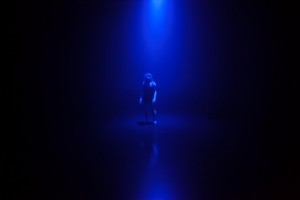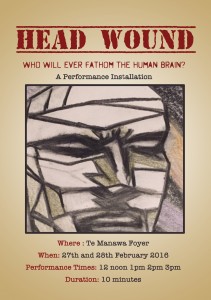Editorial
Welcome to the ninth edition of NUTS NZ – the Newsletter for University Theatre Studies New Zealand. The purpose of the newsletter is to help us communicate more effectively as a community of scholars interested in Theatre and Performance. We have an interesting selection of stories and items for you in this first issue for 2016. In this issue Martyn Roberts has kindly provided us with an outline of his latest project, Dark Matter. We have included a flyer and link to a newspaper article about Head Wound, directed by Angie Farrow, that should be of interest. We have details of the upcoming ADSA Conference “Resilience: Revive, Restore, Reconnect,” as well as details regarding the upcoming Symposium “Empowering Performance.” There are a few prizes and competition to note too. Unfortunately, we could not include out “NUTS People” segment in this edition but it will b featured in the tenth edition.
We plan to circulate our tenth edition of NUTS NZ on the 13 of May , and we will need items of news by 29 April (especially an academic and postgraduate student to showcase). As always, submissions should be sent to the NUTS NZ editor Jane Marshall: j.g.marshall@massey.ac.nz
| Newsletter Issue | Information Required by | Date of Circulation |
| Issue 10 | 29 April 2016 | 13 May 2016 |
| Issue 11 | 29 July 2016 | 12 August 2016 |
| Issue 12 | 28 October 2016 | 11 November 2016 |
Kind regards,
NUTS NZ editors: Jane Marshall and Rand Hazou.
Performances
Dark Matter
Martyn Roberts, Lighting Designer and Professional Practice Fellow in Theatre Studies at The University of Otago presented Dark Matter at the Dunedin Fringe Festival in March 2016. This work presented for the first time, since graduating in 2014, a public showing of his MFA Theatre Studies material. Martyn’s MFA focused on his practice as a lighting designer and in particular the development and refinement of his methodology which involves creating states or scenarios that sit at the edge of perception and understanding. This was explored through three workshops and Dark Matter, a final showing where audiences were engaged in an open and ‘meaning-making’ process creating threshold states. ‘Threshold state’ refers to a point of perception that compels the viewer to engage with an image or sound to create meaning before it vanishes. It was Martyn’s intention to create threshold states across the disciplines of light, sound and site specific space. He also used photography to bring a greater understanding to how meaning, perception and recognition occur in these threshold moments. Dark matter, as in use it here, is a metaphor to describe the unseen, intangible or emergent elements of a performance. Martyn sought to use how we experience these elements to examine aspects of his design process. He is interested primarily in visual design work that privileges the partial and the unseen in order to invite audiences to take an increasingly active role in the meaning-making process. This has long been a focus of his practice as a designer. In this project, Martyn worked to develop, refine and articulate his approach through experimenting with the design tool of light, and by corollary, with sound and space.
Head Wound
Soldiers who survive war might be considered lucky, but they can suffer lifelong psychological damage. A bold new performance work explores the human horrors of war through one man’s struggle to piece together fragments of memory and identity shattered by a traumatic head injury. This performance installation, presented at Palmerston North’s Te Manawa Museum, is directed by Massey University Associate Professor Angie Farrow in collaboration with puppeteer Leda Farrwo, digital lighting designer Luke Anderson, musician and composer Suzie Hawes, and writer John Downie.
For more information access the Massey News story here, or visit the link to the article “Installation Brings Museum to Life” in the Manawatu Standard.
Conferences
ADSA Conference 2016 Resilience: Revive, Restore, Reconnect. Update
Publication reminder
The deadline for submissions for the e-conference proceedings publication for ADSA’s 2016 Conference is rapidly approaching (12th February). The publication will be in two parts. Part One will feature academic papers that can be written and reviewed ahead of time. This part will be published prior to, and launched at the conference. Part Two will feature research that due to its nature and/or mode of presentation can only be properly represented and/or peer reviewed during the conference itself. If you wish to have your work considered for either part, you MUST prepare a submission by Friday 12th February. For Part One, this submission must be your full paper.Please note that the full papers need to closely resemble the work you will present at the conference (rather than a re-write or an extended version), approximately 3000 words in length, and follow the ADS journal style guide. For Part Two this submission will consist of a more fulsome abstract (up to 1000 words detailing research methodology, questions and influences) and a justification of why the work can only be peer reviewed properly during the conference itself as well as a proposal of how the media-rich content (if applicable) will be captured.
Peer review
All people submitting work for consideration in the publication are reminded that by submitting their work they are also agreeing to act as a peer reviewer for up to 4 other submissions at the discretion of the editors. For Part One, these reviews will be due back to the editors by Friday 4th March. All peer reviewers will be acknowledged as part of the publication. If people who are not submitting their work, wish to volunteer to be a peer reviewer, the editors would welcome your expression of interest via emailing a brief bio to them.
Conference Registration
Registration for the conference is now open.Early Bird discounts are available until Friday 29th April. For more details about the conference or to register please follow this link.
Call For Papers
Empowering Performance: Maori & Indigenous Performance Studies Symposium
Te Ara Poutama, Faculty of Māori and Indigenous Development invites proposals for papers and other presentations on the power of contemporary Indigenous performance. Here we ask participants to stake a position in a conversation about the relationship between performance and power in the development of Māori and Indigenous identities and communities.
Where: Auckland University of Technology
When: 8-9 September 2016
For further information, contact Dr. Valance Smith by emailing: vsmith@aut.ac.nz
or visit #KAHAKA2016
Prizes/Competitions
The Marlis Thiersch Prize
- The Award is open to all financial members of ADSA.
- The publication period is January to December 2015.
- There cannot be more than one article or chapter by an author nominated in a given year.
- The winner is announced at the ADSA conference.
- The value of the prize is $500.
Nominations are invited by authors, journal editors and interested scholars, specifying full reference for the work nominated and accompanied by a photocopy of the article or chapter.
The Rob Jordon Prize
Please forward nominations to Alison Richards <alison.m.richards@monash.edu>by 31 March 2016.
Create One World Through Art Competition
Outside your tertiary theatre work, are you in touch with any highschool (Yr 11-13) students studying drama? If so please spread the word and let them know they can enter a short performance into the Creative Activism & Global Citizenship Competition hosted by Massey University and NZ Centre for Global Studies. There are great prizes from UNESCO NZ for winning and commended entries. The competition aligns with NCEA achievement standards so this could be something they could do in class! We invite you to show us how creativity and the arts can contribute to global community-building, and generate creative solutions to pressing planetary issues.
#Create1world – show us how your creativity can connect the world!
If you’re in Year 11, 12 or 13, we invite you to design creative content to promote the idea of global citizenship. The theme of the competition is “create one world through art” – for young people to say, in your own way, how creativity can help us join together to solve some of the problems we face as a planet.
Competition Details
- Think about how creativity can help us better understand and resolve global problems faced by humanity in the 21st Century. Themes might include sustainability, peace, human rights, climate change, refugees, global inequality, international law or the responsibilities of multinational organisations.
- Think about what it might mean to be a ‘global citizen’. There are some research resources (including a report written by young people) on the New Zealand Centre for Global Studies website at http://nzcgs.org.nz/ but you are also encouraged to develop your own ideas about creating global unity through art.
- Check out some of the ‘inspiration items’ on the Creative Activism Facebook Page at https://www.facebook.com/create1world/
- Take your ideas and turn them into a creative output in one of the four categories below:
- Media Studies Category: ($300 first prize, $200 second prize, $100 third prize) – Produce a short (1-3 minutes) media product
- Performance Category: ($300 first prize, $200 second prize, $100 third prize) – Devise and perform a short drama (1-3 minutes) OR construct and deliver a crafted and controlled oral text (1-3 minutes)
- Creative Writing Category: ($300 first prize, $200 second prize, $100 third prize) – Produce a piece of crafted and controlled piece of creative writing in the genre of either poetry or short story
- Music category: ($300 first prize, $200 second prize, $100 third prize) – Compose and record an original song (1-3 minutes long)
- Go to the Creative Activism Facebook Page and upload your submission to the page by 17:00pm NZST on Monday May 2, 2016.
- Preliminary judging will take place following this date. A selection of submissions will be chosen as finalists and announced on Monday May 16, 2016. Finalists will be invited to perform/present at a showcase event as part of the Creative Activism and Global Citizenship Conference on July 1, 2016.
- Come along and see the finalists at the Creative Activism and Global Citizenship Conference on July 1, 2016, and participate in a global conversation about creative activism with leading international artists. Free conference registration closes on Monday June 13, 5pm. Register at this link here.
- To be held on Friday July 1 at Massey University Wellington campus from 9am to 3pm. (Highschool teachers please click here to register your school group). Join us for free lunch, free amazing inspirational creative speakers, and be there when the winners, chosen by our panel of celebrity judges, are announced!


